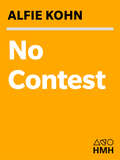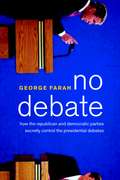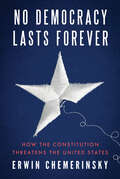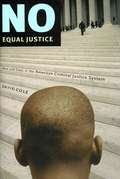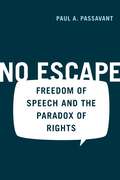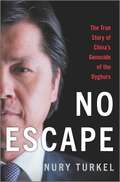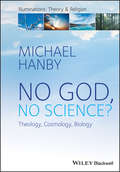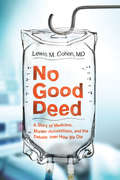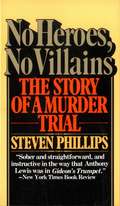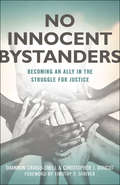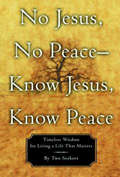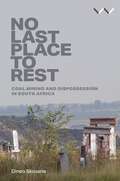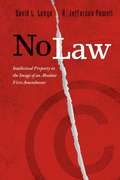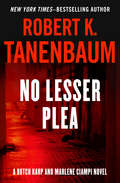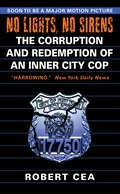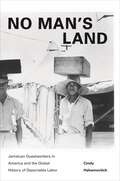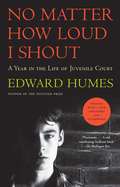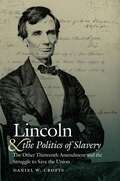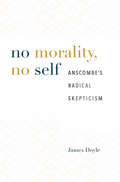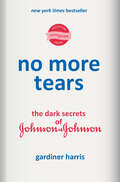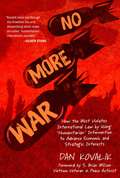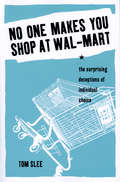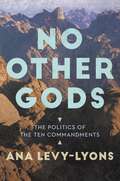- Table View
- List View
No Contest
by Alfie KohnNo Contest stands as the definitive critique of competition. Contrary to accepted wisdom, competition is not basic to human nature; it poisons our relationships and holds us back from doing our best. In this new edition, Alfie Kohn argues that the race to win turns all of us into losers.
No Debate: How the Republican and Democratic Parties Secretly Control the Presidential Debates
by George FarahBroadcast to tens of millions of Americans, the presidential debates are the Super Bowl of politics. A good performance before the cameras can vault a contender to the front of the pack, while a gaffe spells national embarrassment and can savage a candidacy. The slim margin for error has led the two major parties to seek--and achieve, under the aegis of the bipartisan Commission on Presidential Debates--tight control through scripting, severe time limits, and the exclusion of third-party candidates. In No Debate, author and lobbyist George Farah argues that these staged recitations make a mockery of free and fair presidential elections. With urgency and clarity, this book reviews the history of presidential debates, the impact of the debates since the advent of television, the role of the League of Women Voters, the antidemocratic activity of the CPD, and the specific ways that the Republicans and Democrats collude to remove all spontaneity from the debates themselves. The author presents the complete text of a previously unreleased secret document between the Republicans and Democrats that reveals the degree to which the two parties--not the CPD--dictate the terms of the debates. In the final chapter, Farah lays out a compelling strategy for restoring the presidential debates as a nonpartisan, unscripted, public events that help citizens--not corporations or campaign managers--decide who is going to run the White House.
No Democracy Lasts Forever: How the Constitution Threatens the United States
by Erwin ChemerinskyA groundbreaking work from one of America’s leading legal scholars, No Democracy Lasts Forever audaciously asserts that the only way a polarized America can avoid secession is to draft a new Constitution. The Constitution has become a threat to American democracy. Due to its inherent flaws—its treatment of race, dependence on a tainted Electoral College, a glaringly unrepresentative Senate, and the outsized influence of the Supreme Court—Erwin Chemerinsky, the dean of Berkeley Law School and one of our foremost legal scholars, has come to the sobering conclusion that our nearly 250-year-old founding document can no longer hold. Much might be fixed by Congress or the Supreme Court, but they seem unlikely to do so. One might logically conclude that amending the Constitution would solve the problem, yet logic seldom takes precedent, given that only fifteen of the 11,848 amendments proposed since 1789 have passed. Chemerinsky contends that without major changes, the Constitution is beyond redemption in that it has created a government that can no longer deal with the urgent issues, such as climate change and wealth inequalities, that threaten our nation and the world. Yet political Armageddon can still be avoided, Chemerinsky writes, if a new constitutional convention is empowered to replace the Constitution of 1787. Just as the Founding Fathers replaced the faulty Articles of Confederation that same year, we must, No Democracy Lasts Forever argues, rewrite the entire Constitution from start to finish. Still, Chemerinsky goes further than that, suggesting that without serious changes Americans may be on the path to various forms of secession based on a recognition that what divides us as a country is, in fact, greater than what unites us. No Democracy Lasts Forever asserts with exceptional clarity that if the problems with the Constitution are not fixed, we are ineluctably heading toward a crisis where secession is, indeed, possible and where it will be necessary to think carefully about how to preserve the United States as a world power in a very different form of government. Despite these troubles, Chemerinsky remains hopeful, revealing how the past offers hope that change can happen. The United States has been through enormously challenging and divisive times before, with a civil war and the Great Depression, and Chemerinsky ultimately shows that it may still be possible to cure the defects and save American democracy at the same time.
No Equal Justice: Race and Class in the American Criminal Justice System
by David ColeIn a hard-hitting study hailed by "Publishers Weekly" as "well-argued" and "passionate," a leading constitutional scholar reveals that, despite a veneer of neutrality, race- and class-based double standards operate in virtually every criminal justice setting, from police behavior to jury selection to sentencing.
No Escape: Freedom of Speech and the Paradox of Rights
by Paul PassavantConventional legal and political scholarship places liberalism, which promotes and defends individual legal rights, in direct opposition to communitarianism, which focuses on the greater good of the social group. According to this mode of thought, liberals value legal rights for precisely the same reason that communitarians seek to limit their scope: they privilege the individual over the community. However, could it be that liberalism is not antithetical to social group identities like nationalism as is traditionally understood? Is it possible that those who assert liberal rights might even strengthen aspects of nationalism? No Escape argues that this is exactly the case, beginning with the observation that, paradoxical as it might seem, liberalism and nationalism have historically coincided in the United States. No Escape proves that liberal government and nationalism can mutually reinforce each other, taking as its example a preeminent and seemingly universal liberal legal right, freedom of speech, and illustrating how it can function in a way that actually reproduces nationally exclusive conditions of power. No Escape boldly re-evaluates the relationship between liberal rights and the community at a time when the call has gone out for the nation to defend the freedom to live our way of life. Passavant challenges us to reconsider traditional modes of thought, providing a fresh perspective on seemingly intransigent political and legal debates.
No Escape: The True Story of China's Genocide of the Uyghurs
by Nury TurkelA powerful memoir by Nury Turkel lays bare China&’s repression of the Uyghur people. Turkel is cofounder and board chair of the Uyghur Human Rights Project and a commissioner for the United States Commission on International Religious Freedom.In recent years, the People&’s Republic of China has rounded up as many as three million Uyghurs, placing them in what it calls &“reeducation camps,&” facilities most of the world identifies as concentration camps. There, the genocide and enslavement of the Uyghur people are ongoing. The tactics employed are reminiscent of the Cultural Revolution, but the results are far more insidious because of the technology used, most of it stolen from Silicon Valley. In the words of Turkel, &“Communist China has created an open prison-like environment through the most intrusive surveillance state that the world has ever known while committing genocide and enslaving the Uyghurs on the world&’s watch.&” As a human rights attorney and Uyghur activist who now serves on the US Commission on International Religious Freedom, Turkel tells his personal story to help explain the urgency and scope of the Uyghur crisis. Born in 1970 in a reeducation camp, he was lucky enough to survive and eventually make his way to the US, where he became the first Uyghur to receive an American law degree. Since then, he has worked as a prominent lawyer, activist, and spokesperson for his people and advocated strong policy responses from the liberal democracies to address atrocity crimes against his people. The Uyghur crisis is turning into the greatest human rights crisis of the twenty-first century, a systematic cleansing of an entire race of people in the millions. Part Anne Frank and Hannah Arendt, No Escape shares Turkel&’s personal story while drawing back the curtain on the historically unprecedented and increasing threat from China.
No God, No Science
by Michael HanbyNo God, No Science: Theology, Cosmology, Biology presents a work of philosophical theology that retrieves the Christian doctrine of creation from the distortions imposed upon it by positivist science and the Darwinian tradition of evolutionary biology. Argues that the doctrine of creation is integral to the intelligibility of the world Brings the metaphysics of the Christian doctrine of creation to bear on the nature of science Offers a provocative analysis of the theoretical and historical relationship between theology, metaphysics, and science Presents an original critique and interpretation of the philosophical meaning of Darwinian biology
No Good Deed: A Story of Medicine, Murder Accusations, and the Debate over How We Die
by Mitchell CohenAccomplished physician and researcher Dr. Lewis Cohen writes the untold story of two Massachusetts nurses, their struggles with end of life care, and how they were accused of murdering a patient. Captivating and powerful, No Good Deed explores what happens when decisions about end of life issues and the purpose of modern medicine move from the hospital to the courtroom to the church.
No Heroes, No Villains: The Story Of A Murder Trial
by Steven J. PhillipsOn June 28, 1972 in a South Bronx subway station, John Skagen, a white off-duty policeman on his way home, suddenly and without apparent provocation, ordered James Richardson, a black man on his way to work, to get against the wall and put his hands up. Richardson had a gun, and the two exchanged shots. In the melee that followed, Skagen was fatally wounded by a cop who rushed to the scene. In the ensuing trial, William Kunstler handled Richardson's defense and the author of this book, then assistant district attorney, prosecuted the case. Here is a first-hand, behind-the-scenes account of every step of the proceedings.From the Trade Paperback edition.
No Innocent Bystanders: Becoming An Ally In The Struggle For Justice
by Shannon Craigo-Snell Christopher J. DoucotThe struggle for justice is ongoing. In answering the biblical call to act justly and love mercifully, can Christians cross lines of privilege to walk humbly not only with God but with their marginalized neighbors as well? No Innocent Bystanders looks at the role of allies in social justice movements and asks what works, what doesn't, and why. It explains what allies legitimately can accomplish, what they can't, and what kind of humility and clarity is required to tell the difference. <P><P>This book is a start-up guide for spiritual or religious people who are interested in working for social justice but don't know how or where to begin, drawing on the lessons of history, the framework of Christian ideas, and the insights of contemporary activists. It offers practical guidance on how to meaningfully and mindfully advocate alongside all who struggle for a more just society.
No Jesus, No Peace-- Know Jesus, Know Peace: Timeless Wisdom forLiving a Life That Matters
by Two SeekersNo caring, no peace. Know caring, know peace ... Never before has Jesus' wisdom felt so relevant, insightful, and applicable as in this surprising volume. Offered here are twenty-two nuggets of wisdom that will move you, guide you, and nourish your daily life. Intended as an indispensable manual, this book will help point you to true north and inner peace. Its authors, who call themselves simply "two seekers," mastered their problems only after absorbing the lessons contained in these pages. By combining pithy insight with practical how-to examples, they demonstrate -- even to committed skeptics -- why saying "no" to Jesus' teachings could be saying "no" to the kind of self-knowledge that enables one to change not only his or her own life but those of others.
No Last Place to Rest: Coal Mining and Dispossession in South Africa
by Dineo SkosanaThis book examines the impact of coal mining on the lives of former-labour tenant and rural communities in post-apartheid South Africa.No Last Place to Rest: Coal Mining and Dispossession in South Africa is an exploration of the ongoing struggles faced by families in the Mpumalanga and KwaZulu-Natal provinces of South Africa whose lives have been upended by the relentless expansion of coal mining operations. These regions, burdened with the task of fulfilling the nation's energy needs and boosting the country’s economy, witness daily the harsh realities of dispossession that extend far beyond the mere loss of property.Dineo Skosana presents a compelling argument that dispossession remains a present-day reality and crisis, contradicting the notion that it is merely a relic of the past in the post-apartheid landscape. It challenges the narrow perspective that equates land loss in material and economic terms only. Skosana considers the impact of grave relocations—a common occurrence in these mining-dominated locales— and the profound spiritual anguish and dehumanisation communities endure as their lands are excavated. In African societies, connections to the land extend beyond the material; land has a sacred and ancestral value. Grave relocations disrupt this connection families have with their ancestors. In dispossessing not only the living but also the dead from their lands, the author argues that the act wounds the collective soul of a people, eroding their cultural heritage, and collective identity and belonging.This book offers a rich ethnographic account of the experiences, struggles and resistance of the affected communities as well as a critical analysis of the legal and policy frameworks that enable their exploitation. In relation to the ‘land question’ in South Africa, No Last Place to Rest presents deep insights for communities, activists and government sectors acting in support of social justice and redress.
No Law
by H. Jefferson Powell David L. LangeThe conflict between the First Amendment and intellectual property protection laws is examined in this book for practitioners and general readers who possess a basic understanding of legal issues. Lange and Powell (law, Duke U. ) discuss the ideas and merits of American intellectual property laws and the importance of the freedom in expression in intellectual productivity, and then pit these ideals against a thorough historical review of the strength of the First Amendment. The authors recommend a solution that allows Congress to regulate incentives for intellectual creation while upholding the Constitution. Annotation ©2009 Book News, Inc. , Portland, OR (booknews. com)
No Legal Grounds
by James Scott BellSuccessful attorney Sam Trask is stunned when a voice from the past threatens to use secrets from Sam's youth to destroy him. The law offers Sam no protection, leaving him one way to save his family and the heart of his life and faith: take the law into his own hands.
No Lesser Plea: No Lesser Plea, Depraved Indifference, And Immoral Certainty (Butch Karp and Marlene Ciampi #1)
by Robert K. TanenbaumFirst in the New York Times–bestselling series: Two district attorneys go up against a brilliant killer in this &“exceptionally good&” legal thriller (Publishers Weekly). The plan was simple: When the manager carries the bags of money out of the supermarket, Mandeville Louis will be waiting with a shotgun. He&’ll kill the manager, kill the guard, and cruise away. But when Louis&’s driver shows up late, he&’s forced to improvise—and the result is a disaster. He storms a liquor store, killing two and leaving a trail the cops have no trouble following. But even behind bars, Mandeville Louis won&’t go down without a fight. An expert in legal procedure, Louis has never met a loophole too small to shimmy through. He&’s going to bob and weave his way into a plea bargain and back onto the streets—unless Butch Karp can stop him. A firebrand assistant district attorney who&’s just been assigned to Homicide, he wants to make an example of Louis. With the help of the brilliant Marlene Ciampi, Karp intends to break Mandeville Louis—and strike a blow for justice. Written by a legendary prosecuting attorney, No Lesser Plea is a perfect introduction to this saga of life in gritty 1970s New York. No Lesser Plea is the 1st book in the Butch Karp and Marlene Ciampi series, but you may enjoy reading the series in any order. &“Butch Karp and Marlene Ciampi are the most interesting pair of characters in the suspense genre today.&” —Chicago Tribune &“An attorney himself, Tanenbaum has infused this book with a strong collection of characters, a raunchy energy that crackles in the out-of-office lawyer talk and a basic sense of outrage at a system that is failing miserably.&” —Publishers Weekly
No Lights, No Sirens: The Corruption and Redemption of an Inner City Cop
by Robert CeaA New York Police Officer's relentless journey into the criminal netherworld, told with brutal truth and honesty. Perhaps Neitzsche described Rob Cea's life best, way before he was born: "Take care when chasing the animals; for you can very well become the animal you are chasing." No Lights, No Sirens is a sojourn so dirty and nasty it defies belief. Rob Cea starts off as an idealistic young cop, a true believer in the system for which he works tirelessly. He is sadly mistaken. The system he tried so hard to appease ultimately led to his downfall and the ruination of his life. What separates this from other cop—and—robber stories is the brutal authenticity from the cop himself. We will see and hear exactly what is discussed in a patrol car. We will see how the law was—and is—routinely bent to make collars stick any way possible. And we will see how Cea slowly spirals to depths of hell. No Lights, No Sirens is simplistic in its scope: A young idealistic boy becomes a man through fire, and then becomes exactly what he has been chasing for so long, a hardened man possessed by demons. With rapid fire and gritty narrative, Cea writes about his fall to the depths, and his salvation. We see the dark side of detective work in New York's most crime—riddled neighborhoods from a first-hand view never before seen.
No Man's Land: Jamaican Guestworkers in America and the Global History of Deportable Labor (Politics and Society in Modern America #97)
by Cindy HahamovitchFrom South Africa in the nineteenth century to Hong Kong today, nations around the world, including the United States, have turned to guestworker programs to manage migration. These temporary labor recruitment systems represented a state-brokered compromise between employers who wanted foreign workers and those who feared rising numbers of immigrants. Unlike immigrants, guestworkers couldn't settle, bring their families, or become citizens, and they had few rights. Indeed, instead of creating a manageable form of migration, guestworker programs created an especially vulnerable class of labor.Based on a vast array of sources from U.S., Jamaican, and English archives, as well as interviews, No Man's Land tells the history of the American "H2" program, the world's second oldest guestworker program. Since World War II, the H2 program has brought hundreds of thousands of mostly Jamaican men to the United States to do some of the nation's dirtiest and most dangerous farmwork for some of its biggest and most powerful agricultural corporations, companies that had the power to import and deport workers from abroad. Jamaican guestworkers occupied a no man's land between nations, protected neither by their home government nor by the United States. The workers complained, went on strike, and sued their employers in class action lawsuits, but their protests had little impact because they could be repatriated and replaced in a matter of hours.No Man's Land puts Jamaican guestworkers' experiences in the context of the global history of this fast-growing and perilous form of labor migration.
No Matter How Loud I Shout: A Year in the Life of Juvenile Court
by Edward HumesNow updated with a new introduction and afterword, this award-winning examination of the nation's largest juvenile criminal justice system in Los Angeles by a Pulitzer Prize-winning journalist is "an important book with a message of great urgency, especially to all concerned with the future of America's children" (Booklist).In an age when violence and crime by young people is again on the rise, No Matter How Loud I Shout offers a rare look inside the juvenile court system that deals with these children and the impact decisions made in the courts had on the rest of their lives. Granted unprecedented access to the Los Angeles Juvenile Court, including the judges, the probation officers, and the children themselves, Edward Humes creates an unforgettable portrait of a chaotic system that is neither saving our children in danger nor protecting us from adolescent violence. Yet he shows us there is also hope in the handful of courageous individuals working tirelessly to triumph over seemingly insurmountable odds. Weaving together a poignant, compelling narrative with razor-sharp investigative reporting, No Matter How Loud I Shout is a convincingly reported, profoundly disturbing discussion of the Los Angeles juvenile court's failings, providing terrifying evidence of the system's inability to slow juvenile crime or to make even a reasonable stab at rehabilitating troubled young offenders. Humes draws an alarming portrait of a judicial system in disarray.
No Mercy Here: The Other Thirteenth Amendment And The Struggle To Save The Union (Civil War America Ser.)
by Sarah HaleyNo Morality, No Self: Anscombe’s Radical Skepticism
by James DoyleElizabeth Anscombe’s “Modern Moral Philosophy” and “The First Person” have become touchstones of analytic philosophy but their significance remains controversial or misunderstood. James Doyle offers a fresh interpretation of Anscombe’s theses about ethical reasoning and individual identity that reconciles seemingly incompatible points of view.
No More Tears: The Dark Secrets of Johnson & Johnson
by Gardiner HarrisAn explosive, deeply reported exposé of Johnson & Johnson, one of America’s oldest and most trusted pharmaceutical companies—from an award-winning investigative journalist. <p> “A page-turning drama that raises life-or-death questions about the world’s largest healthcare conglomerate.”—Jonathan Eig, Pulitzer Prize–winning author of King: A Life. <p> One day in 2004, Gardiner Harris, a pharmaceutical reporter for The New York Times, was early for a flight and sat down at an airport bar. He struck up a conversation with the woman on the barstool next to him, who happened to be a drug sales rep for Johnson & Johnson. Her horrific story about unethical sales practices and the devastating impact they’d had on her family fundamentally changed the nature of how Harris would cover the company—and the entire pharmaceutical industry—for the Times. <p> His subsequent investigations and ongoing research since that very first conversation led to this book—a blistering exposé of a trusted American institution and the largest healthcare conglomerate in the world. Harris takes us light-years away from the company’s image as the child-friendly “baby company” as he uncovers reams of evidence showing decades of deceitful and dangerous corporate practices that have threatened the lives of millions. He covers multiple disasters: lies and cover-ups regarding the link of Johnson’s Baby Powder to cancer, the surprising dangers of Tylenol, a criminal campaign to sell antipsychotics that have cost countless lives, a popular drug used to support cancer patients that actually increases the risk that cancer tumors will grow, and deceptive marketing that accelerated opioid addictions through their product Duragesic (fentanyl) that rival even those of the Sacklers and Purdue Pharma. <p> Filled with shocking and infuriating but utterly necessary revelations, No More Tears is a landmark work of investigative journalism that lays bare the deeply rooted corruption behind the image of babies bathing with a smile. <b>New York Times Bestseller</b>
No More War: How the West Violates International Law by Using 'Humanitarian' Intervention to Advance Economic and Strategic Interests
by Dan Kovalik"Kovalik helps cut through the Orwellian lies and dissembling which make so-called 'humanitarian' intervention possible." —Oliver Stone War is the fount of all the worst human rights violations―including genocide―and not its cure. This undeniable truth, which the framers of the UN Charter understood so well, is lost in today&’s obsession with the oxymoron known as &“humanitarian" intervention.No More War: How the West Violates International Law by Using 'Humanitarian' Intervention to Advance Economic and Strategic Interests sets out to reclaim the original intent of the Charter founders to end the scourge of war on the heels of the devastation wrought by WWII. The book begins with a short history of the West&’s development as built upon the mass plunder of the Global South, genocide and slavery, and challenges the prevailing notion that the West is uniquely poised to enforce human rights through force. This book also goes through recent &“humanitarian" interventions carried out by the Western powers against poorer nations (e.g., in the DRC, Congo, and Iraq) and shows how these have only created greater human rights problems – including genocide – than they purported to stop or prevent.No More War reminds the reader of the key lessons of Nuremberg – that war is the primary scourge of the world, the root of all the evils which international law seeks to prevent and eradicate, and which must be prevented. The reader is then taken through the UN Charter and other human rights instruments and their emphasis on the prevention of aggressive war.
No One Makes You Shop at Wal-Mart: The Surprising Deceptions of Individual Choice
by Tom SleeWe live in a culture of choice. But, in an age of corporate dominance, our freedom to choose has taken on new meaning. Upset with your local big box store? Object to unfair hiring practices at your neighbourhood fast food restaurant? Want to protest the opening of that new multinational coffeeshop? Vote with your feet! What if it’s not that simple? In No One Makes You Shop at Wal-Mart, Tom Slee unpacks the implications of our fervent belief in the power of choice. Pointing out that individual choice has become the lynchpin of a neoconservative corporate ideology he calls MarketThink, he urges us to re-examine our assumptions. Slee makes use of game theory to argue that individual choice is not inherently bad. Nor is it the societal fix-all that our corporations and governments claim it is. A spirited treatise, this book will make you think about choice in a whole new way.
No Other Gods: The Politics Of The Ten Commandments
by Ana Levy-LyonsAna Levy-Lyons, a minister who is equally at home in secular and religious worlds, offers a deeply perceptive reinterpretation of the Ten Commandments for our modern lives. The Ten Commandments are a spiritual resource for social justice. A politically and spiritually brazen prescription for living, the Ten Commandments would turn our world upside down if we actually followed them. Far from being only ethical norms on which everyone already agrees or a remnant of a bygone oppressive era, the Commandments are actually countercultural practices. Today the Ten Commandments are a divisive part of American culture. Religious conservatives champion them, even if they don't always practice them. Religious liberals and the nonreligious may bristle at what they perceive as antiquated moral restrictions. But, this ancient code still has vital contemporary relevance. Rev. Levy-Lyons explores ways the Commandments bring us meaning, illuminate our values, and help us navigate through the turbulent waters of social injustice, environmental crises, and societal inequity. NO OTHER GODS looks at each Commandment in new ways, moving beyond interpersonal morality to the global economy and our hyper-connected age. From the first, You Shall Have No Other Gods Besides Me (Dethrone the Modern Deities of Political, Social, and Corporate Power), to the tenth Do Not Covet (Practice Your Liberation-You Have Enough, You Are Enough)-and all those in between-she underscores how the Commandments can produce a bold spiritual consciousness. Whether you are deeply religious or spiritual-but-not-religious, learn how the Ten Commandments can guide you to resist injustice, heal our earth, and find personal dignity amid the free-for-alls of modern life. "We don't have to invent a bunch of new practices for a meaningful way to live out our spirituality and social justice politics," says Levy-Lyons. "There is a perfectly good set of ten of them, all ready to go, with as much progressive firepower as any of us can handle, that has existed for some three thousand years."
No Pity
by Joseph P. ShapiroPeople with disabilities forging the newest and last human rights movement of the century.From the Trade Paperback edition.
